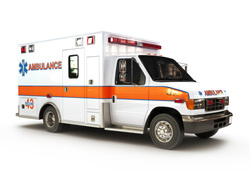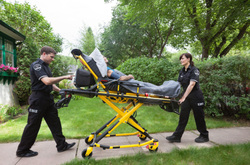 Anytime you're researching paramedic schools and training courses, it’s typical to have many concerns about the application process. Am I too old to be a paramedic? How much cash does a paramedic make? Can I get a job as a paramedic in America if I was born beyond the borders of America? Can you train to be a paramedic if you’ve been charged with a crime? Still, most significant questions prospective paramedic students have centers on past college experience. Individuals thinking about seeking paramedic training want to know one important thing: Do I need to go to college to become a paramedic? And do I need to graduate a paramedic program with a college degree in order to become a medic? Or is becoming well trained with advanced life support skills sufficient to obtain a job working on an ambulance truck? The answer, fortunately, is that a prior college degree isn't needed to become a paramedic, nor is it essential in order to apply to a paramedic training course. The job of a paramedic is truly one of many positions in America that, while significant training is needed, doesn’t require a college degree. So yes, a youthful person directly out of twelfth grade could hypothetically become an EMT and then apply for paramedic training without needing to provide the school or program a copy of their college degree. That being said, a lot of schools that supply paramedic training desire that students possess prior work experience as an EMT, as that usually makes students a lot more able to succeed in clinical rotations or field internships. In fact, you can enroll in a paramedic program that simply offers you a Paramedic Certificate, allowing you to then take the NREMT exams and apply for state licensure. However, there are many benefits to graduating paramedic class with a college degree. The advantages are the following: The primary advantage concentrates on take home pay. Earning an Associate’s Degree in Paramedicine Science, for instance, permits you to show a potential employer that you’ve effectively excelled in a longer, more comprehensive paramedic program. You’ve received more training, experienced additional hours of instruction and received far more clinical supervision compared to others in your particular field. This could possibly give you a advantage within an already competitive employment market. And with the everyday paramedic earnings being about $38,000 every year, any scenario that can give you a leg up with regards to both job security and annual salary is ideal. The next benefit to a paramedic degree is work advancement. Working as a paramedic is a wonderful and satisfying experience, but it can also be a stepping stone to other professions in health care, like a physician’s assistant (PA), a registered nurse (RN), or an EMS educator. Not only will an Associate’s Degree support you with a better job, but academic expansion too, if you choose you’d like to transfer to a 4 year college. So is a paramedic degree required for potential students? The answer is no, it's not necessarily. But students who decide to remain in school longer to receive a college degree related to their paramedic schooling (rather than a certificate) can certainly benefit far more by having extra career opportunities over time. Need to know more on how to become a EMT Paramedic? If so, be sure to drop by http://www.paramedictrainingspot.com when you get a chance!
 Understanding how to become a paramedic can be tough, because various schools have unique requirements for their applicants. Not just that, but different states have numerous requirements for their working paramedics too, thus muddying the waters for anybody interested in learning how to become a paramedic but uncertain ways to get accurate and pertinent facts about the subject. To become a paramedic, you must first meet the criteria set by both the state and also the school of your liking. You will then need to graduate from a paramedic school, where you will take the NREMT-P exams and/or a state licensing examination. Once you formally obtain credentials through an EMS agency in your state, you’ll be capable of working as an EMT-P. If you’re interested in chasing a career as a paramedic, let us discuss three actions you ought to really think about taking. 1) Learn the Requirements Requirements vary from state to state, but typically, the eligibility demands for many paramedic schools and programs are the following: You should be 18 years of age. You will need to be a high school graduate, or possess a GED. You ought to have a valid driver’s license. You will need to have specified certifications (CPR, for example). You need to be a licensed EMT (despite the fact that real EMT experience isn’t often a necessity). From that point, the prerequisites for becoming a paramedic could vary greatly. For instance, in a state like The Lone Star State, you may be requested by a paramedic program to take the THEA test (Texas Higher Education Assessment), or perhaps an approved alternate examination like COMPASS. In some states, because you ought to be no less than 18 years old in order to enroll in a paramedic program, students will actually require an Associate’s Degree or more to become licensed to practice. 2) Apply to a Paramedic Program Figuring out which school to apply to is usually confusing, but it’s all about picking out a school which you believe gives you the ideal education and instruction. Whatever school you choose, it’s encouraged that most paramedic students give consideration to enrolling in an accredited school or program. Come January 1, 2013, all prospective paramedics who want to become Nationally Registered must have graduated from an accredited paramedic program in order to do so. 3) Graduate. Get Certified. Acquire Your License. When you finish a paramedic program, you’ll most likely want to become nationally certified from the NREMT. This necessitates passing the NREMT exams, which comprise of both a computer adaptive examination and a skills test. Passing the NREMT exams is a demonstration of meeting a national certification norm. It also gives you significantly greater flexibility in the event you move to a different state and submit an application for reciprocity (provided it’s a state that accepts the National Registry as their standard for admittance and licensure). But becoming Nationally Registered does not give you consent to work. Only the state you plan to work in can do that, and that’s through licensure. Getting licensed might sometimes be as easy as giving the state a copy of one's NREMT card. Some states, nonetheless, demand those attempting to get licensure to pass a state test. The paramedic in you is just waiting to be developed. To do so, visit http://www.paramedictrainingspot.com to learn the requirements needed by all working paramedics. You'll also be able to find accredited paramedic training programs, as well!
 Despite the fact that it’s typically not a requirement to have work experience before registering for a paramedic course, it is always extremely helpful. In fact, despite the quality education you’ll be given in the classroom, or perhaps the supervision you’ll get throughout clinical rotations, there’s really no replacement for actual work experience, specifically when it comes to executing patient assessments. Having said that, individuals who want to become a paramedic can still earn beneficial experience that can better ready them for paramedic school. It’s true that the job of a paramedic can never be simulated in any other venue, but we’ve defined a few very helpful ways for you to plan for what the life of a paramedic will ultimately be like. It’s worth noting that these ideas are simply just ideas, and so they in no way are bound to help you progress in paramedic school, successfully pass the NREMT exams, or be a top quality paramedic on an ambulance truck. 1) Work As An Emergency Medical Technician This is the most apparent solution to attaining work experience, but if you’re a certified EMT and are thinking about eventually becoming a paramedic, actual job experience is excellent. Although EMTs aren’t allowed to give drugs by mouth and intravenously, and should not use medical devices like an EKG, you will still acquire vital experience in assessing a patient’s affliction, in addition to managing a wide array of unforeseen emergencies. You’ll also discover exactly what a average day is like for an EMT or paramedic, comprehend the amount of hours that they work, and experience the importance of making quick decisions under strain. 2) Becoming a Volunteer EMT Though making a salary as an EMT is good, a number of companies would prefer to employ people who have previously obtained some work experience. And a fantastic way to obtain that experience is via volunteer work. Regardless of whether it’s a ride-along via a nearby fire division, or making an effort to deliver efficient emergency medical care through an ambulance service, working as a volunteer is a priceless experience that will extend your understanding of Pre-hospital Care management, especially in how it works in conjunction with the Emergency Department. 3) Become a Lifeguard For people with desires of being a paramedic, but are under the age of 18, there's still a method that you can obtain valuable experience with regards to saving lives in high-pressure scenarios. Get hired as a lifeguard. Being a lifeguard may seem like a cushy job for a young adult, but there’s a great deal of responsibility that is included with the job. Not only will you be in charge of the security of numerous people at a swimming pool or beach, but a lifeguard also needs to work 20-40 hours weekly after having been well-trained for the job. A lot like an EMT or paramedic, a lifeguard needs to obtain a number of certifications, too. Principal among these is correct CPR certification, as well as First Aid certification. Although a lifeguard doesn’t equal a paramedic with regard to work schedule or all round responsibility, it’s a fantastic job for any youngster focused on the EMS field to gain critical communication skills, understand the significance of safety, and effectively tackle any potential medical emergency situation. Need more information on paramedic training? Want to find out more about accredited schools? Just need a simple paramedic job description? If so, look no further than http://www.paramedictrainingspot.com.
 Just before you enroll into paramedic school, it’s crucial to understand whether you’re physically and mentally equipped to become a paramedic. Many men and women that want to become a paramedic do so because a few of their loved ones work in medical care, or they just love the very thought of aiding people. And although that’s remarkable, those qualities don’t necessarily signify you’re suited to become an EMT-P. Being a paramedic, you may be placed into various circumstances that involve pained people or major catastrophes. You will notice grotesque things, experience scary situations, and will need to make prompt assessments while a person’s existence hangs in the balance. A high quality paramedic will require several of the following traits to be able to have a extensive and productive career in EMS. Here are those 5 qualities paramedic or a paramedic student requires to achieve success: 1) A paramedic needs to be prepared to manage pressure and emotional stress. In athletics, commentators typically discuss outstanding players having “ice water throughout their veins” the moment the game is on the line and the ball is in their control. Precisely the same can be said for a paramedic, who may come across quite a few surprising circumstances in the field, on the ambulance truck or inside a hospital. You have got to keep a clear head rather than succumb to the pressure of the moment, as a person’s life can truly depend on your decision-making and ability to take immediate action. 2) A paramedic will need to have an iron stomach, because he or she will observe some distressing things while at work, most notably blood. If you’re somebody who gets nauseous at thinking of “blood and guts,” or doesn’t feel they’ll have the capacity to work effectively amid filthy, disgusting, and sometimes repulsive accident conditions, then you’re probably not cut out to be a paramedic. 3) You will need to not just be in good shape to become a paramedic, but have the capacity to lift considerable amounts of weight. A paramedic at an ambulance service, for example, may be required to not only lift up to 125 pounds, but additionally pull up to 150 pounds of weight and push up to 250 pounds of weight. In addition to being physically and mentally strong, the career of a paramedic requires a good deal of sitting, standing upright, and reaching too. 4) A paramedic should also take pleasure in the rush of excitement, as well as have both assertive and sympathetic characteristics. Sometimes, paramedics will need to shove their way through a crowd when on the scene. At the same time, an EMT-P must realize how to correctly speak with patients who could be scared of their situation, physically pained or afflicted with a condition. 5) You must be prepared to get small amounts of sleep in some cases. It’s not unusual whatsoever for a paramedic to work a full day straight, and then be given the subsequent two days off. As previously mentioned, a paramedic should take pleasure in the rush of excitement. But with that excitement comes unknown circumstance. A paramedic rarely knows the specific situation she or he may experience during a given working day, as it’s possible to be jeered, bombarded, and even possibly hit by a automobile or shot at while working. Paramedics might also have to deal with patients who hemorrhage profusely or perhaps possess a communicable sickness, so while becoming an EMT or paramedic is incredibly satisfying, it takes a considerable amount of hard work and determination, and isn't devoid of its fair share of dangers. Still interested in learning how to be a paramedic? Wonde
 The overall approach to paramedic training is difficult. From picking out classes to determining how you can balance your school life with your own personal life, working to become a paramedic can be pretty worrying. Unfortunately for a few prospective paramedics, the very idea of working out the way to pay for paramedic classes is often equally as troubling as the paramedic curriculum itself. Dependent upon your age, you’re coping with a variety of different challenges at this time. If you’re younger, you’re energized to understand more about becoming a paramedic, but are worried that you just don’t have the funds to cover the classes because, well, you’re young and also have minimal experience. If you’re a more mature and more established person that’s now interested in pursuing paramedic training, you might be fortunate enough to have income saved away for paramedic courses. The dilemma, obviously, is everything else that accompanies an established life: monthly dues, a mortgage loan, and kids. So how can you find the money to go to paramedic school? Is it like going to college, where there are financial loans or scholarships or other ways to supplement the high cost of courses? Well, luckily, paramedic schools do provide students various forms of financial assistance. And here’s how it works. For starters, whenever a school is accredited, there’s a strong likelihood it participates in the Federal Direct Loan Program. Federal financial aid is rather essential, since it permits a prospective paramedic student to select the school that best suits him or her, as opposed to the student feeling required to decide on a school or training program only because it will fit inside their budget. Listed below are the types of financial assistance you can obtain for paramedic school: Scholarships: A scholarship is an award of financial aid uniquely given to students to help and fund their education. You’re most likely familiar with merit-based scholarships, but need-based scholarships can require students to submit financial assistance applications such as FAFSA. Grants: There are federal grants and state grants. A federal grant, for example, is given based upon monetary need by the data applicants place onto a FAFSA form. Grants are not required to be paid off. Loans: In contrast to a grant, a loan must be repaid. And as mentioned earlier, any time a school is accredited, there’s a possibility that it participates within the Federal Direct Loan Program. Federal Work-Study: A federal work-study program is a federally financed program in America that enables students to work part-time in exchange for a paycheck that they could then use to help finance their higher education. The following is the simplest way you can fill out an application for financial aid: A student should sign up for financial aid by filling out an application that’s offered at www.fafsa.ed.gov. The application is generally known as the Free Application for Federal Student Aid (better known as FAFSA). Paramedic students might also be in a position to obtain private loans to help fund their education, also. Yet again, it’s usually a wise idea to speak with an official employed in the school’s financial aid department to help sort out any questions or problems possibly you have entire process. To learn more about paramedic school, along with more information on paramedic training requirements, be sure to visit Paramedic Training Spot!
 Anytime you actively Google search for paramedic training programs, it can often be frustrating to see how much time it will actually take you to become a paramedic. The time period you have to spend inside a paramedic program fluctuates by school, however in the mind of a number of people, it may seem like a very long time if you want to graduate, acquire a job, and produce a healthy income. Because of this, some prospective paramedics look into ways they can fast-track themselves to becoming a trained paramedic. Looking for accelerated paramedic training courses, as well as online or free paramedic training, several potential students end up pondering suspicious schools that are often referred to as “medic mills” by a few inside the health care industry. The term “medic mill” is usually said a negative way to explain a school or course that either provides accelerated paramedic training or requires practically no prerequisites (an Anatomy and Physiology course, for instance). To put it briefly, the term “medic mills” are often tossed around by prospective pupils as schools that are untrustworthy or provide a shady shortcut to becoming an EMT-P. A “medic mill” can almost be a pejorative saying used by a few who think that a particular school doesn’t thoroughly prepare its students to become a paramedic. This is a result of a lack of thorough didactic instruction, or perhaps a poorly conceptualized clinical or field internship. But how do you avert a “medic mill?” And should you even avoid it to start with? The most important thing you should consider is that choosing a paramedic program is critical for your long-term achievement. The wrong program can leave you unprepared for both the NREMT exams, and the varied emergencies you’ll confront inside an ambulance or medical facility. With that in mind, an incredibly extensive or expensive training program doesn’t necessarily equate to a school that’s good for you. If you’re looking for which school is best, it’s always smart to focus on accredited paramedic programs. By 2013, all paramedic students will be required to have passed an accredited paramedic program should they want to be in a position to take the National Registry of Emergency Medical Technicians exams. Beyond that, however, it’s important that you know that even though accelerated programs, hybrid classes, and “medic mills” can be very helpful and hassle-free, you must know that outstanding paramedic training necessitates a great deal more than book smarts or an ability to be a superb test taker. Patient assessment is extremely important to being an excellent paramedic. And while some of this is taught, it’s by way of experience in the classroom, clinical, and field internships that best helps students hone these skills. Not all patients can easily relate their problems or health issues to a paramedic, so it's up to the working medic to adequately assess people, symptoms, and the personal injuries of your respective patients through verbal and non-verbal interaction. Those interested in fast-tracking their path to becoming a paramedic should recognize that while there are programs in place that enable you to do just that, it’s significantly more important that you become a high quality paramedic, not merely a quick one. To read more on medic mills, along with information pertaining to paramedic salary and training, be sure to visit Paramedic Training Spot!
 Paramedic classes are typically time consuming and strenuous, leaving a number of people to speculate just how much time it can take to complete paramedic school. And while there’s little question that paramedic classes take longer to complete than ones specializing in EMT training, it’s tough to give a precise amount of years it normally takes prospective pupils to finish a paramedic program mainly because it varies widely depending on the school. Still, paramedic school is usually categorized into about three parts: didactic, clinical, and field internships. Didactic education provides pupils with lectures and hands-on skills training. Clinical instruction uses in-hospital shifts to help students receive beneficial exposure to genuine patients. And a field internship places young people in the hands of a genuine paramedic unit. Throughout a field internship, students are oftentimes asked to carry out the entire scope of practice for an EMT-P, while under the watchful eye of a capable paramedic. A paramedic program is vast and tremendously comprehensive. Each school has its own required hours the program usually takes to complete. And while it’s seemingly impossible to provide a precise estimate for how long paramedic classes take, a projected guess is anywhere from 6 months to 2 yrs. But understand that this really depends upon the school’s individual program. A paramedic course will provide its pupils with a challenging curriculum that features but is not limited to Anatomy and Physiology, Emergency Pharmacology, Patient Assessment and Airway Management, Cardiology, Trauma Management, Medical Management. While participating in a paramedic course, you will also be taught invasive skills such as: External jugular cannulation, Intravenous initiation, Intra-osseous infusions, Electrocardiogram rhythm identification, Defibrillation, Chest decompression, and much more. The main reason why paramedic school typically takes longer to finish is generally dependent on the student, . Despite the fact that a number of students may join a full-time program, several other students might juggle their daily courses with their career, spouse and kids, as well as other personal hardships. Due to this fact, it’s possible that some folks may choose to consider being a part-time paramedic student. This could possibly mean that instead of usually meeting with your teacher several times a single week, you simply take your lessons on the weekend. While this really is far easier for a student, it may also mean that it may take an individual 2 whole years to conclude a course of study that otherwise may have taken merely a single year or less to complete. The price tag on taking paramedic training courses demands a brief note here, as well. Paramedic students should expect to be charged a tuition expense that reaches into the several thousand-dollar range. It’s also quite possible that you’ll have additional payments too, ones which will take care of things like training books along with clothing. In short, paramedic school could take anywhere from around six months to two years to finish since the program is developing you to ultimately save people's lives. This is the reason why it's important to possess very strong advanced life support education. To learn more about how long it takes to become a paramedic, be sure to visit http://www.paramedictrainingspot.com!
|







 RSS Feed
RSS Feed